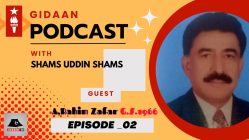Malik Siraj Akbar’s recent article questioning Dr. Mahrang Baluch’s silence on the Baloch Liberation Army’s (BLA) actions and her potential Nobel Peace Prize nomination is a textbook example of the flawed and often weaponized demand for condemnation. This demand, akin to the tired refrain of “Do you condemn Hamas?” or the knee-jerk “All Lives Matter” response to“Black Lives Matter, ” seeks to delegitimize the Baloch struggle by pinning the actions of armed groups like the BLA on peaceful activists like Dr. Mahrang Baluch and her organization, the Baloch Yakjehti Committee (BYC). Such arguments not only misrepresent Dr. Baluch’s clear and consistent stance but also ignore the broader context of Baloch resistance against systemic oppression.
Dr. Baluch’s Stance Is Clear: Peaceful Advocacy, Not Militancy
Dr. Mahrang Baluch has never wavered in her commitment to peaceful advocacy for Baloch rights. As the leader of the BYC, she has tirelessly raised awareness about enforced disappearances, extrajudicial killings, and the exploitation of Balochistan’s resources by the Pakistani state. Her approach is rooted in nonviolent resistance, dialogue, and international advocacy—a stark contrast to the armed struggle pursued by groups like the BLA. To suggest, as Akbar does, that Dr. Baluch’s silence on specific BLA actions implies complicity or selective activism is a gross mischaracterization of her work and principles.
Dr. Baluch’s silence on the BLA is not an endorsement of violence; it is a recognition that her role as a peaceful activist does not require her to play into the state’s narrative. The Pakistani state and its allies have long sought to conflate the actions of armed groups with the broader Baloch struggle, using such conflations to delegitimize all forms of resistance—peaceful or otherwise. By demanding that Dr. Baluch condemn the BLA, Akbar inadvertently echoes this narrative, placing an unfair burden on her to distance herself from actions she has never supported or condoned.
The False Equivalence of Condemnation Politics
The demand for condemnation is a familiar tactic used to discredit marginalized leaders and movements. When Palestinians advocate for their rights, they are often asked, “Do you condemn Hamas?” —a question designed to shift focus from Israeli occupation to internal Palestinian dynamics. Similarly, when Black activists in the United States chant “Black Lives Matter, ” far-right voices quickly counter with “All Lives Matter, ” diluting the specific grievances of Black communities. These tactics are not about promoting universal human rights; they are about deflecting attention from systemic oppression and forcing marginalized leaders into a no-win situation.
This pattern is not unique to the Baloch or Palestinian contexts. In her 2020 article for The Nation, titled “The Condemnation Trap: Why Demanding Palestinian Leaders Denounce Violence Is a Distraction, ” Maha Nassar argues that such demands are a form of “condemnation politics” that shifts the burden of responsibility onto oppressed communities while ignoring the root causes of violence. Nassar notes that Palestinian leaders are often asked to condemn armed groups like Hamas, even when their advocacy is peaceful, as a way to delegitimize their cause. Similarly, Dr. Baluch faces a trap: if she condemns the BLA, she risks alienating the very communities she represents, many of whom view armed groups as a response to decades of state violence and neglect. If she remains silent, critics like Akbar accuse her of selective activism. This false equivalence ignores the structural power imbalances at play: Dr. Baluch is not a state actor, nor is she responsible for the actions of armed groups. Her role is to advocate for Baloch rights, not to serve as a mouthpiece for the Pakistani state’s narrative.
The Baloch Struggle: Multifaceted Resistance Against Oppression
The Baloch struggle is multifaceted, with different groups employing different strategies to resist oppression. The BLA and other armed groups operate in a context of systemic violence, where the Pakistani state has been accused of committing human rights abuses, including enforced disappearances, extrajudicial killings, and resource exploitation. While the BLA’s methods may be controversial, their actions cannot be pinned on peaceful activists like Dr. Baluch or the BYC, just as the actions of armed Palestinian groups cannot be pinned on Palestinian human rights defenders.
To demand that Dr. Baluch condemn the BLA is to ignore the root causes of Baloch militancy. Armed resistance in Balochistan did not emerge in a vacuum; it is a response to decades of state repression, marginalization, and broken promises. Dr. Baluch’s focus on peaceful advocacy does not negate the legitimacy of her cause, nor does it require her to condemn every act of violence committed in the name of Baloch rights. Her silence on specific BLA actions is not a moral failing—it is a refusal to play into a narrative that seeks to delegitimize the broader Baloch struggle.
The Nobel Peace Prize: Recognizing Resistance, Not Conformity
Akbar’s argument that Dr. Baluch’s silence on the BLA undermines her eligibility for the Nobel Peace Prize is equally flawed. The Nobel Peace Prize has historically been awarded to individuals who challenge oppressive systems, often in the face of immense personal risk. Dr. Baluch’s work fits this mold: she has risked her life to advocate for Baloch rights, organizing peaceful protests, documenting human rights abuses, and amplifying the voices of Baloch families affected by state violence.
The demand for condemnation as a prerequisite for recognition is a form of gatekeeping that seeks to impose Western standards of “acceptable” resistance on marginalized leaders. Dr. Baluch’s refusal to condemn the BLA does not diminish her commitment to peace; it reflects her understanding that the Baloch struggle cannot be reduced to a binary of violence versusnonviolence. Her work is about addressing the root causes of conflict, not appeasing critics who demand performative denunciations.
Conclusion: Dr. Baluch Does Not Need to Condemn to Prove Her Worth
Dr. Mahrang Baluch’s stance is clear: she is a peaceful advocate for Baloch rights, committed to nonviolent resistance and international dialogue. She does not need to condemn the BLA to prove her moral consistency, just as Palestinian activists do not need to condemn Hamas to prove their commitment to peace, and Black activists do not need to say “All Lives Matter” to validate their fight for justice. The Baloch struggle is a multifaceted resistance against systemic oppression, and Dr. Baluch’s role within it is distinct from that of armed groups like the BLA.
Malik Siraj Akbar’s demand for condemnation is a distraction from the real issues at stake: the Pakistani state’s ongoing abuses in Balochistan and the need for a just resolution to Baloch grievances. Dr. Baluch’s work stands on its own merits, and her silence on the BLA is not a moral failing—it is a refusal to play into a narrative that seeks to delegitimize her cause. If the Nobel Committee recognizes her contributions, it will be for her unwavering commitment to peace and justice, not for conforming to the demands of condemnation politics








Add comment